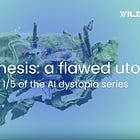📌 Why we need to fear from AI generated content: boon or bane for digital trust
AI case studies: July 2024 | How AI is transforming the world?
New email: 📌 Why we need to fear from AI generated content: boon or bane for digital trust
Hey there, Yael!
Forget fake news, brace yourself for fake everything: How AI is poised to turn the internet into a playground of synthetic lies, drowning us in a sea of digital distrust.The rise of AI-generated content presents a double-edged sword. While it offers efficiency and creativity, its potential dangers loom large. The unchecked spread of low-quality, synthetic content could erode trust in digital information altogether, leading to a society rife with skepticism and "information fatigue."
What to expect?
AI-generated content: A threat to digital trust?
AI can be weaponized to create highly believable but fabricated content. Deepfakes, for instance, can manipulate videos to make it seem like someone said or did something they never did. This can sow discord, damage reputations, and blur the line between truth and fiction.
AI algorithms are trained on existing data, which can be inherently biased. This bias can be reflected in the content they generate, perpetuating stereotypes and fueling social divisions. People exposed to constant biased content may become distrustful of all information sources.
The ease of generating AI content could lead to a surge of low-quality, repetitive information flooding the digital space. This "content spam" can overwhelm audiences, making it difficult to discern genuine content and leading to information fatigue – a state of apathy towards information overload.
So, what is important now?
Beyond the initial concerns of a weakened democracy and hindered progress, the erosion of trust in digital information can have far-reaching consequences that ripple throughout society:
Weakened democracy: Public trust in institutions and media is crucial for a healthy democracy. If AI-generated misinformation erodes trust, it can cripple informed decision-making and lead to political polarization.
Hindered progress: Scientific advancements and innovation rely on the free flow of accurate information. A climate of skepticism can make it difficult to accept new ideas and hinder progress.
Manipulation and exploitation: Malicious actors can exploit the erosion of trust to manipulate public opinion and spread propaganda. This could have devastating consequences for social and economic stability.
More than that, our collective responsibility is to address growing challenges like:
Social fragmentation: When trust in information crumbles, communities find it harder to agree on basic facts. This fuels social polarization, making it difficult to have productive conversations and solve common problems. Imagine public health crises where conflicting information undermines vaccination efforts or disaster relief.
Erosion of expertise: Experts rely on the public to trust their findings. If AI fuels the spread of misinformation targeting specific professions (e.g., scientists and journalists), it can erode public trust in their expertise. This can hinder scientific progress and the adoption of critical new technologies.
Rise of conspiracy theories (and there are a lot!): In a climate of distrust, conspiracy theories flourish. People desperate for answers may turn to fringe narratives that offer easy explanations. This can lead to irrational decision-making and even violence.
Declining mental well-being: Constant exposure to conflicting information can be mentally draining. People might develop a sense of helplessness or cynicism, leading to anxiety and depression. Particularly vulnerable are younger generations who have grown up entirely in the digital age.
Chilling effect on free speech: In an effort to combat misinformation, governments might enact stricter regulations on online content. This could lead to censorship and stifle legitimate criticism, even if not the original intention.
Domino effect:
These consequences can have a domino effect. Social fragmentation weakens social cohesion, making it harder to address the issues that fuel conspiracy theories. Declining mental well-being can lead to a decline in civic engagement, further weakening democratic institutions.
The things to know
A call for a multi-faceted approach:
It's not just about technology. To rebuild trust, we need a multifaceted approach. This includes:
Media literacy education: Empowering people to evaluate information critically.
Supporting quality journalism: Funding independent fact-checking and investigative journalism.
Holding platforms accountable: Pressuring social media companies to combat misinformation actively.
Promoting open dialogue: Encouraging open dialogue and civil discourse to bridge divides.
By addressing these issues head-on, we can ensure the digital world remains a space for truthful information, fostering a vibrant and engaged society.
Existing solutions to combat AI-generated content issues:
Fact-checking platforms: Established players like Snopes and PolitiFact are expanding their capabilities to identify and debunk AI-generated misinformation.
Transparency tools: Initiatives like the Provenance Project aim to embed traceable markers within content to identify its origin, human or AI-generated.
Browser extensions: Extensions like "FakeAware" utilize machine learning to flag potentially manipulative content and provide users with resources for verification.
AI-powered detection software: Companies like SIFT (Stanford Internet Observatory) develop AI tools to automatically detect deepfakes and other synthetic media for platforms.
Collaborative initiatives: The DARPA (Defense Advanced Research Projects Agency) launched the SHIELD program, a collaborative effort between researchers and tech companies to develop methods for identifying manipulated media.
Explore more
Share you thoughts
How do you think artificial intelligence is transforming the world?
Please take a moment to comment and share your thoughts.
📌 AI case studies
You are receiving this email because you signed up for Wild Intelligence by Yael Rozencwajg. Thank you for being so interested in our newsletter!
AI case studies are part of Wild Intelligence, approaches and strategies.
We share tips to help you lead, launch and grow your sustainable enterprise.
Become a premium member, and get our tools to start building your AI based enterprise.





